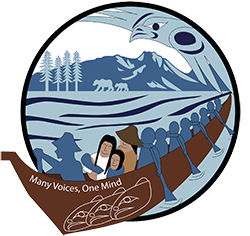Protocols
Protocols are ways of interacting with Indigenous people in a manner that respects traditional ways of being. Protocols are unique to each Indigenous culture and are a representation of a culture's deeply held ethical system. They differ vastly from one Indigenous culture or community to another, and they can be complex and multi-layered.
Coming to understand and practice protocols appropriately is a lifelong learning process even for Indigenous people growing up within their culture. Following protocols is a significant sign of respect and awareness. It shows that you are taking the time to learn about Indigenous cultures and are challenging the often unconscious bias that everyone should interact in the way that mainstream settler
In a circle we are all equal, no one is above or below, or at the front of a conversation. Our energies flow better, because we are all connected. We place the issue at hand in the middle and work together to resolve differences, lift people up, share how we feel. There is nothing between us when we gather this way.
A Potlatch is a traditional gift-giving ceremony and feast practiced by Indigenous Peoples. It is a significant social and cultural event characterized by the four protocols (welcoming, feasting, witnessing, and gifting). It serves as a way to reinforce community ties, demonstrates generosity, and affirm cultural identity and traditions within these communities.
Raising hands is a gesture often used by Indigenous People as a sign of respect, greeting, or acknowledgement. It can also be a way to signify peace, showing honor, unity, offering thanks, or a request to speak during a gathering or ceremony. It is essential to remember that different communities may have unique customs and interpretations, so the meaning can vary.
Try to avoid the situation by learning the expectations in advance and then watching closely to see what is being done by others. However, if you do accidentally break protocol, remain humble and do not try to make excuses or defend yourself. If someone corrected you, thank them for the teaching. Always remember to keep an open heart and an open mind.
